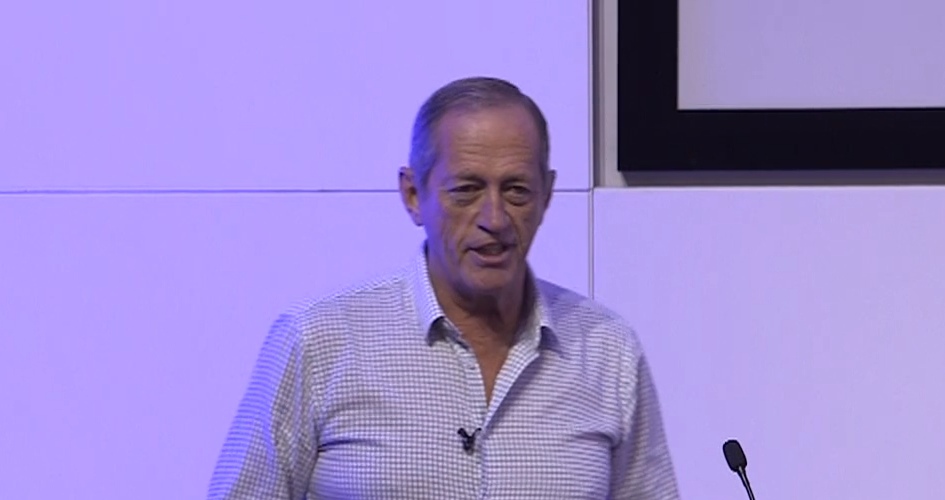Dr Peter Brukner presents the opening remarks of day two of the Public Health Collaboration conference in May 2019.
He takes a look where the world is in terms of improving metabolic health and injects a strong dose of humour into his presentation.
Peter is a medical doctor and sports and exercise medicine physician with a key interest in nutrition. Peter has been team doctor for a number of teams including Liverpool Football Club.
Statistics, research and conferences
Peter opens his talk by sharing a number of stats, from the proportion of people that are overweight to headlines and statistics relating to difficulties in affording healthy food.
One striking statistic is that, in the US, just 12% of adults are regarded to be metabolically healthy.
The statistics show the world to be struggling with health, but Peter is keen to point out the positive changes in direction.
He draws attention to research that has showed a dramatic improvement in depression and anxiety with a low carb, ketogenic diet.
Peter touches that the majority of disease now is due to chronic low-grade inflammation and that dietary change is one of the main ways to combat low-grade inflammation.
He provides a review of a range of conferences that are recognising the benefits of a low carbohydrate approach.
One of these was a conference in conjunction with the British Medical Journal that paired different groups of researchers together. This meant that researchers with different approaches to lifestyle were brought together and it presented a great way for the researchers to see how much the different approaches they had agreed with one another.
Veganism and the EAT Lancet diet
Peter next takes a look at the EAT Lancet diet which was a big talking point in nutrition research within the last year. The EAT Lancet was designed to be a diet that would be more sustainable for the planet. However, there is significant debate as to whether the diet achieves this aim and moreover, whether it would promote long-term health.
The EAT Lancet diet recommends a switch away from fish and animal-based foods towards greater intake of plant-based foods.
Peter raises an issue regarding conflicts of interest among authors of the EAT Lancet diet and shares a review by Zoe Harcombe that showed the diet to be deficient in a number of key vitamins and minerals.
The next report Peter turn to is about the World Health Organisation withdrawing their sponsorship of the diet initiative after an Italian official raised a number of key concerns about the diet.
Peter states he personally has no issue with the ethical considerations people have. He questions the environmental benefits of veganism and states that there are two sides to the story.
In terms of whether there are health benefits, Peter is fairly convinced that a vegan diet is not a healthier approach for people.
Diabetes
Next, Peter turns his focus towards diabetes. “Diabetes is a great battleground for us and we’re winning,” he states.
Peter sees it as important that the American Diabetes Association (ADA) is recognising low carb as being ok for people with diabetes.
He shows consensus recommendations published by the ADA which emphasise eating non-starchy vegetables, minimises added sugar and refined grains, and recommend to choose whole foods over highly processed foods.
The recommendations also recognise that reducing carbohydrate intake for people with diabetes has shown the most evidence for improving blood glucose levels.
Peter states that some of the changes being made is “massive progress”. He also mentions though that the ADA is still struggling to accept the notion that fat (or as Peter puts it – the f-word) can be perfectly healthy.
In Australia, the Dietitians Association of Australia (DAA) has stopped taking sponsorship from the processed food industry. Furthermore, the state of Western Australia has recognised the benefits of both low calorie and low carbohydrate approaches in the management of type 2 diabetes.
Difficulties faced
In his next part of the review of the year, Peter turns his attention to some of the major difficulties in helping the world choose healthier nutrition.
Large, multi-national food corporations are funding health and nutrition research and they are allowed to play a leading role in developing dietary guidelines.
Peter shares the news that one US state has even passed a law preventing cauliflower rice from being sold.
Lifestyle change taking place
Peter next takes a look at survey findings that show that 58% of Americans blame either sugars or carbohydrate chiefly for weight gain, while only 16% blame fat.
He also draws attention to that fact that 16% of Americans say they are following a carbohydrate-restricted diet.
Peter notes how continuous glucose monitoring is changing the way people are looking at what they eat, stating: “When you wear a continuous glucose monitor, you’ve got instant feedback on what is happening to your blood glucose”
Peter encourages the audience to give continuous glucose monitoring a try for two weeks so people can see what is happening to their glucose levels when they eat different types of foods.
Peter concludes his talk by looking at how well accepted the low carb approach is in society and he believes that the world has got to a point whereby the diet is starting to get recognised by an ‘early majority’ of the public that are now seeing the diet as pragmatic.




